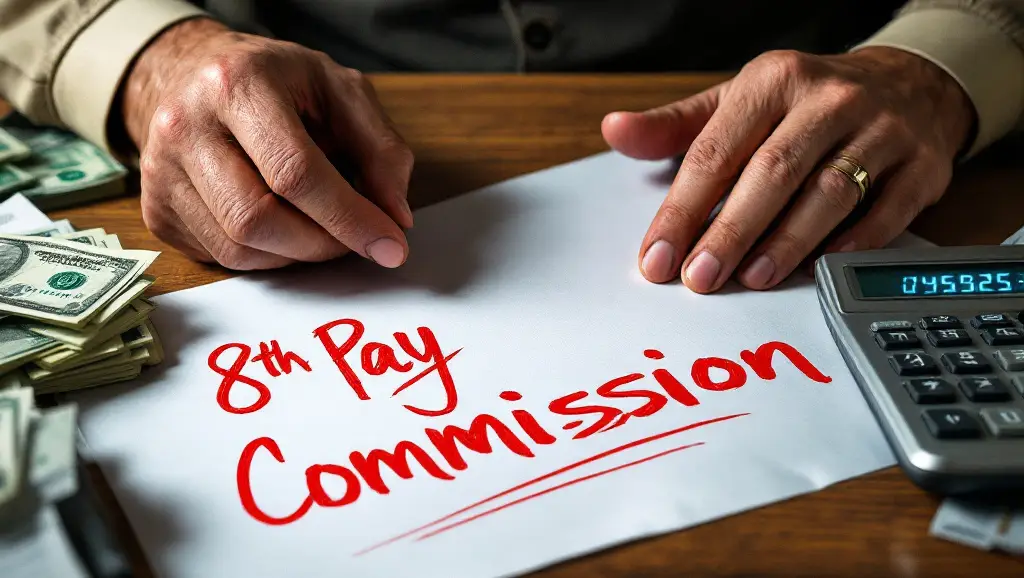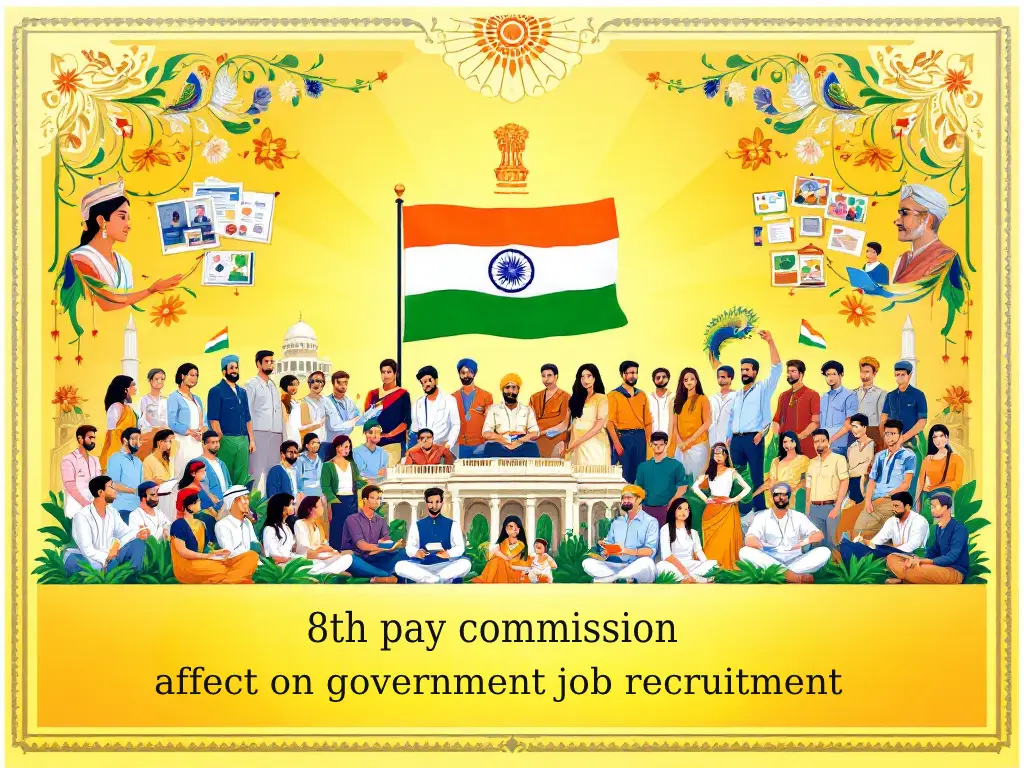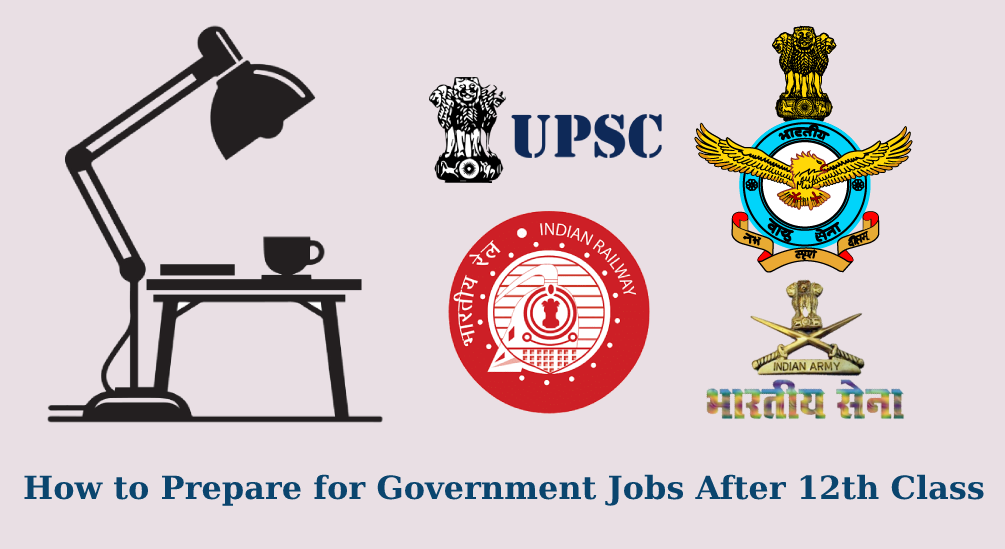Yes, it will affect but not directly. Various hidden factors will be responsible. In this government jobs in India have always been a hot topic—whether it’s about their prestige, job security, or perks like endless cups of subsidized tea in office canteens. That is the reason for these lucrative government jobs. A large number of youth start preparing for government jobs. The 7th Pay Commission was established on January 1, 2016, announced by Union Minister Ashwini Vaishnaw, that the recommendations of the 7th Pay Commission are effective till 2026. The 8th Pay Commission date was January 16, 2025. The moment someone whispers “Pay Commission,” ears perk up faster than you can say arrears. So, does the 8th Pay Commission affect government job recruitment? Let’s break it down, plain and simple.
8th Pay Commission
In new pay commission (8th Pay Commission) focused on the Fitment Factor, Dearness Allowance. The 8th Pay commission also called 8th central pay commission because central government staff much more benefited rather than other government employee.
The 8th Pay Commission is expected to be formed by the Union Cabinet to review and revise the salaries of central government employees. With rising inflation and changing economic conditions, the commission will assess how wages should be adjusted to keep up with the cost of living while supporting economic growth. Like previous pay commissions, it will suggest changes to salaries, pensions, and allowances. The final decision will be made by the Prime Minister and the cabinet, considering the financial impact on the government. If approved, the government may reflect the changes in the Union Budget, aiming to balance employee welfare with the country’s economic stability.
The Money Factor: Show Me the Paisa!
Let’s face it, when it comes to choosing a job, salary plays a huge role. The 8th Pay Commission, like its predecessors, aims to revise the pay, allowances, and pensions of government employees. If it promises a fat paycheck with perks, government jobs suddenly become the gold standard of employment. After all, who wouldn’t want a job that pays well and ensures you don’t have to check your phone for LinkedIn notifications about “exciting opportunities”?
With better salaries, these jobs naturally attract more candidates. Everyone from fresh graduates to those bored of corporate KPIs (Key Performance Indicators, for the uninitiated) suddenly gets interested in becoming a Sarkari Babu.
When the 8th pay commission latest news is spread every one have below question in our mind about the salary.
How much salary increase in 8th Pay Commission ?
How will 8th Pay Commission salary structure ?
If I simply explain changes or answer of above question with new 8th Pay commission changes in pay structure or salary structures then difficult to understand let’s understand by difference 7th vs. 8th Pay Commission.
Latest Salary structures
Minimum Salary:
The 7th Pay Commission established the minimum salary at ₹18,000 per month. However, under the 8th Pay Commission, the minimum salary is projected to be around ₹41,000, with certain reports indicating that it may increase to ₹51,480 based on the fitment factor. So, you can see very huge difference in salary revisions.
8th pay commission fitment factor:
The 7th Pay Commission established a fitment factor that varied between 2.57 and 2.81 based on multiple criteria; however, the 8th Pay Commission has standardized the fitment factor to approximately 2.28.
Salary Increase Percentage:
The 7th Pay Commission recommended a salary increase of 14.29%. In addition, the 8th Pay Commission is expected to propose a salary hike ranging from 20% to 35%, which will also incorporate an increase in the fitment factor as suggested. According to percentage anybody can easily calculate by our minimum basic pay or minimum basic salary.
Allowances
Dearness Allowance (DA):
The 7th pay commission did not significantly raise the DA. However, the 8th pay commission improved the DA and brought it closer to the minimum of the pay bands or pay scales for central government employees.
The 8th pay commission introduced other allowances like House Rent Allowance (HRA) and Transport Allowance (TA). These allowances, included in basic pay or salary, significantly impact employee salaries.
Pension Structure & Gratuity Benefits:
The minimum pension under the 7th pay commission was ₹9,000 per month, with adjustments. The 8th pay commission is expected to raise pensions by up to 30%. The approx 65 lakh pensioners will take a benefit of it.
The gratuity, which has already been raised, has reached a commendable ceiling of ₹20 lakh as per the recommendations of the 7th Pay Commission; however, further improvements are still warranted.
You can get more idea by 8th Pay Commission official website.
More Perks = More Aspirants

Apart from salaries, the Pay Commission has a way of sweetening the deal with perks—housing allowances, healthcare benefits, travel reimbursements, and more. Add a pinch of free gym memberships or subsidized holidays (okay, maybe not yet, but one can dream), and voilà! Government jobs become irresistible.[/caption]
This creates a ripple effect: More people apply for these roles, leading to tougher competition. Getting into a government job post-Pay Commission can feel like a national-level entrance exam. It already does.
The Budget Drama: Will There Be a Freeze?
Here’s the catch. While higher pay is good news for employees, it comes with a hefty bill for the government. If a significant chunk of the budget goes toward paying existing employees, recruitment numbers might take a hit. A recruitment freeze could loom on the horizon like that awkward relative who overstays their welcome.
This means fewer vacancies or delayed hiring cycles, especially in non-priority sectors. The pay commission is good news for current employees. Aspiring candidates may have to wait longer to benefit from the pay increase.
The Armed Forces Angle

Now, let’s talk about the armed forces—a sector where recruitment is always a big deal. Higher pay and better allowances can certainly make these jobs more appealing, especially for youngsters from rural areas or economically weaker sections. Who wouldn’t want a job that combines patriotism with a solid paycheck?
But, better pay might also lead to less attrition, meaning fewer personnel retiring early or leaving, which in turn creates fewer vacancies for fresh recruits. So, while the job becomes attractive, getting in might feel like winning the lottery. Most of the rural areas youth start preparing for government jobs but due to a lack of good opportunities related to guidance they start preparing for armed forces jobs. You can get government jobs after 12th and government jobs after graduation. However, due to financial problems in rural areas youth start preparing for the armed forces because there is physical fitness is required so, they have.
The Humorous Side: Aspirants vs. Reality
Here’s where things get funny. After every Pay Commission, there’s a flood of memes on social media. One of my favorites? A job aspirant said, “Sarkari naukri le li toh zindagi set hai,” followed by a long sigh from a current employee buried under paperwork.
Government jobs may look glamorous from the outside, but let’s not forget the endless file work, transfer orders, and the legendary waiting game for promotions. It’s like buying a gym membership on New Year’s—exciting at first until reality kicks in.
Conclusion: A Mixed Bag
So, does the 8th Pay Commission affect government job recruitment? The answer is a resounding yes but with strings attached. It makes these jobs more attractive and competitive, but it might also lead to budget constraints and fewer vacancies.
If you’re planning to hop onto the government job bandwagon post-8th Pay Commission, just remember: while the paycheck and perks are great, patience is key. And hey, once you’re in, enjoy the chai and those glorious casual leaves. After all, what’s a government job without a few perks that make your private-sector friends jealous?
Frequently asked Questions (FAQ):
Is there any 8th Pay Commission salary Calculator ?
Currently officially there is no calculator but you can calculate on the basis of various component Basic Pay, Fitment Factor and addition of Allowances. You have to just align all component and get the How much salary hike can Central govt employees expect. Let me explain you by below example.
Basic Pay band: ₹16,000
Fitment Factor: 2.08
Basic Salary : ₹18,000 × 2.08 = ₹32,280
DA (60%): ₹32,280 × 60% = ₹19,968
Expected salary increase: ₹32,280 + ₹19,968 = ₹52,248 (excluding HRA and other benefits).
Is 8th pay commission make effect on private employees ?
The 8th Pay Commission will not directly impact private-sector employees, as it applies only to central government and public sector employees. However, it may have indirect effects. If government salaries increase, private companies might adjust pay scales to stay competitive in hiring talent. Additionally, higher government wages could contribute to inflation, affecting the cost of living for private employees. Some private-sector workers, especially in industries linked to government contracts, may demand salary hikes. However, private companies set salaries based on market conditions and business performance, so the impact varies by industry and employer policies.





